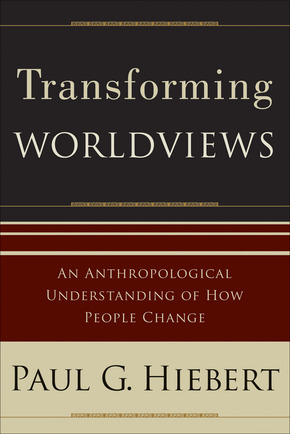
As part of his Doctor of Ministry (DMin) in Ministry to Emerging Generations (Gordon-Conwell Theological Seminary), Tom’s written a number of book responses and given several short presentations (personal and group). In this series he not only “shares the wealth,” but also looks forward to your feedback as he refines his project: An argument for vocational discernment for graduate studies in the context of InterVarsity Christian Fellowship (Stay tuned to learn more!). Earlier posts on the program: Ministry to Emerging Generations and The Big Picture of Ministry to Emerging Generations.
Transforming Worldviews: An Anthropological Understanding of How People Change
With Christmas and the Urbana Student Missions Conference less than a month ago, Paul Hiebert’s Transforming Worldviews: An Anthropological Understanding of How People Change (Grand Rapids, MI: Baker Academic, 2008) opening considering of Santa Claus in a South Indian Christmas pageant hit a nerve. Although I have read a lot of material on worldview, I do not remember the “garbled” missionary message and responses–behavior, beliefs, and worldview in the context of a community–receiving proper attention. Yes, it is time to develop “An Anthropological Understanding of How People Change” and continue to refine its application in our “glocal” missional contexts (122).
Except for some very helpful figures, Hiebert’s outlining of “The Concepts” and “The Characteristics” of Worldviews in “Human Contexts” (Chapters 1-3) did not bring new material to the table. But “Chapter 4: Methods for Analyzing Worldviews” engaged me with the introduction of ethnosemantic analysis in the “art” of uncovering worldviews (91-97). Although much to gain from the several methods offered, I desire to revisit and focus upon “the words people use and how these words are grouped into larger semantic sets and domains” (91).
“Chapter 5: Worldviews of Small-Scale Oral Societies” sent me back to stories of “themes that are difficult for modern people to understand” (105), in particular the holistic worldview of small scale societies which I heard at Urbana through the years and a Fall class on Epistles taught by a professor from Tanzania. In Epistles, the professor shared the different lens for understanding biblical passages offered by his native village. In particular I was struck by how the “presence” of ancestors and spirits in a rural, communal setting (i.e., shared intergenerational familial living) led to a more dynamic entering of the biblical story. This has led to deeper conversation with a friend from Africa. For the Small-Scale Oral Society, storytelling in the context of the creation is part of one’s way of life.
In “Chapter 6: Peasant Worldviews,” the figures on belief systems reminded me how simplistic I have become in categorizing “religion.” I gave time to prayerfully considering the relationship between “Villages and Modernity” (138-139). I confess an idealized, dare I say “Romantic” longing for village life. Hiebert’s engagement of Jacques Ellul’s perspective on technique, at the heart of the mechanistic worldview (163-164) [stay tuned for an upcoming post on Ellul’s The Presence of the Kingdom], brought a number of the pieces of the puzzle together for me as I reflected upon “[t]he [positive and negative] effects of modernity on missions from the seventeenth to the centuries” (210). But what about today? “Chapter 8: The Worldview of Late Modernity or Postmodernity” and “Chapter 9: The Post-Postmodern and the Glocal Worldview” inspired me to continue reading. The relationship of globalization to localization and material such as offered by the Appendices [“Appendix 1: A Model for Worldview Analysis” (335), “Appendix 2: A Comparison of American and Indian Worldviews” (337-344), and “Appendix 3: Modern/Postmodern Shift” (345-346)] requires more attention at the Urbana Student Missions Conference.
Hiebert’s building toward, instead of starting with, “Biblical Worldview” (Chapter 10) and “Transforming Worldviews” (Chapter 11) was an excellent approach. His humble Jesus-centered love story encourages me as I wait upon the Lord’s transformative work (cognitive, affective, evaluative, 312-314) when sharing the Gospel across cultures with individuals and communities. “At the core of worldview transformation is the human search for coherence between the world as we see it and the world as we experience it” (315). Hiebert’s challenge for missionaries and ministers to “remember that transformation must begin in us” is humbling: “We must first experience transformation in ourselves and our churches. Only then can we bear authentic witness to the gospel and exemplify the transformation to which everyone is called” (316). AND his concluding thoughts regarding the dynamic nature of personal and cultural/communal worldview is vital, a perspective in contrast to the older static and ordered rendering of worldviews. May Christ the Lord truly be the center of our lives (320) as we go forth sharing Christ through word, deed, and way of life as part of the Body of Christ.
To God be the glory!
Tom enjoys daily conversations regarding living out the Biblical Story with his wife Theresa and their four girls, around the block, at Elizabethtown Brethren in Christ Church (where he teaches adult electives and co-leads a small group), among healthcare professionals as the Northeast Regional Director for the Christian Medical & Dental Associations (CMDA), and in higher ed as a volunteer with the Emerging Scholars Network (ESN). For a number of years, the Christian Medical Society / CMDA at Penn State College of Medicine was the hub of his ministry with CMDA. Note: Tom served with InterVarsity Christian Fellowship / USA for 20+ years, including 6+ years as the Associate Director of ESN. He has written for the ESN blog from its launch in August 2008. He has studied Biology (B.S.), Higher Education (M.A.), Spiritual Direction (Certificate), Spiritual Formation (M.A.R.), Ministry to Emerging Generations (D.Min.). To God be the glory!

Leave a Reply